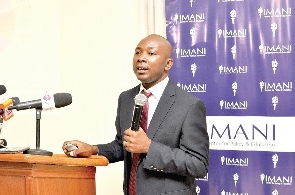 Professor Godfred Bopkin, Economist
Professor Godfred Bopkin, Economist
Economist, Prof Godfred Bopkin has advised government to strategise its competitive market response following the postponement of the implementation of The African Continental Free Trade Area (AfCFTA).
According to him, for Ghana to competitively chalk gains across market sectors in the sub-region, it must make investments in agriculture in order to compete in the services sector.
Speaking in an interview with GhanaWeb, Prof Bopkin explained; “The reasons for us [Ghana] to take advantage of the prioritisation and investment in agriculture is that, it offers us [Ghana] a low hanging fruit within the sub-Saharan Africa region to be able to take advantage of the current postponement of the AfCFTA to strategise and be competitive on the market”
“This is because if you look at the broad sectors within Africa right now, we [Ghana] cannot compete in the area of financial services because we have not capitalised much in that area so we must critically identify the sectors where Ghana wants to compete within the AfCFTA,” he added.
The Professor of Finance said even though the initial implementation date of the AfCFTA has been deferred to January 2021, Ghana is required to strengthen its private sector to compensate any impending losses that may come from hosting the AfCFTA secretariat.
“Though Ghana is hosting the AFCFTA secretariat, it does not mean that we will be hosting the gains that come with the agreement,” he cautioned.
The African Continental Free Trade Area (AfCFTA) Secretariat is now targeting January 2021 for the commencement of the implementation of the pan-African free trade agreement following its postponement due to the outbreak of the Coronavirus pandemic.
According to the AfCFTA Secretary-General, Wamkele Mene, it is imperative for member countries to conclude negotiations on trade tariffs and other protocols under the AfCFTA within the next six months.
The continental free-trade area would be the world’s largest economic free trade zone, adjudged by spatial size and population, and is expected to increase intra-African trade from the current 12 percent of total trade by African countries to 52 percent by 2023.